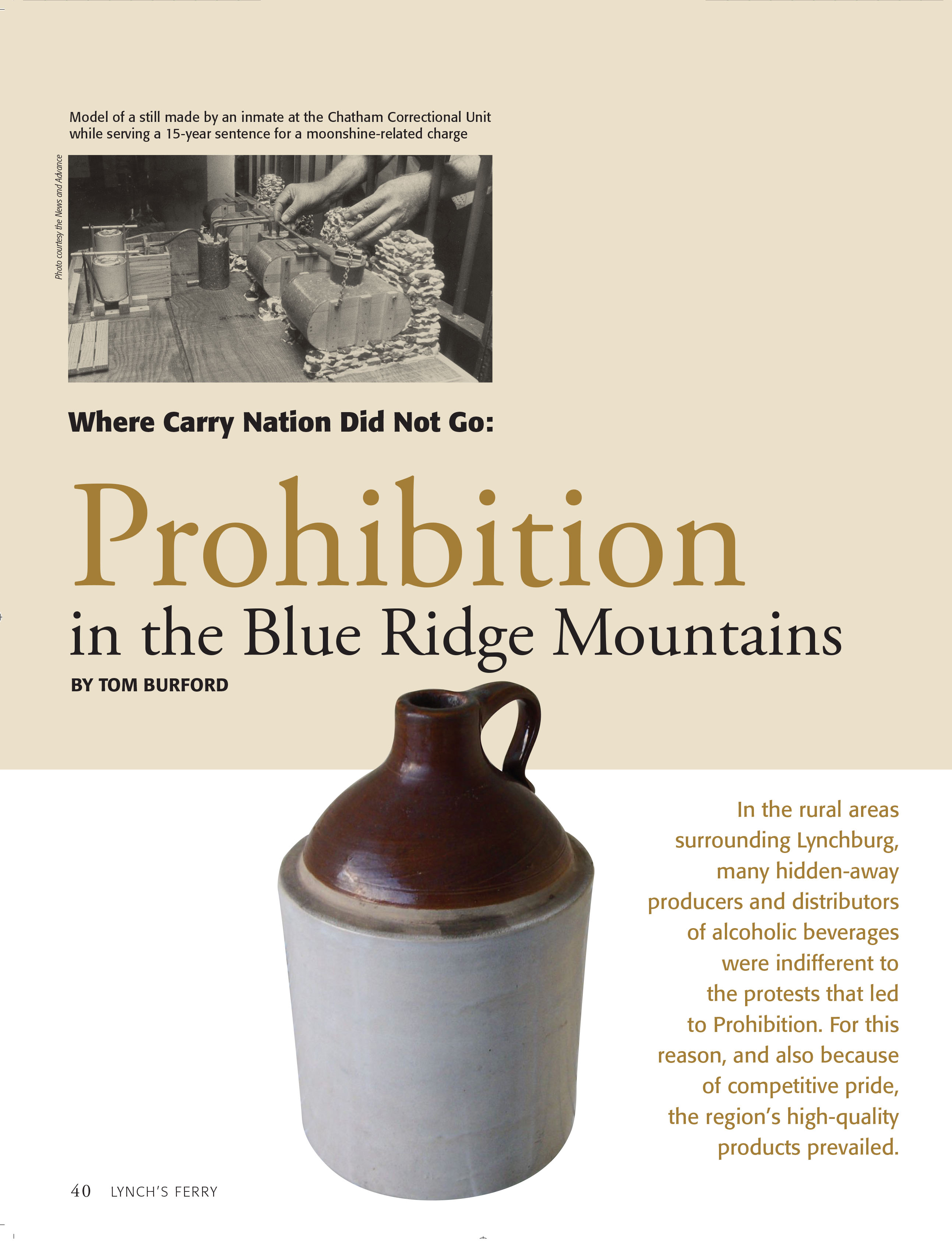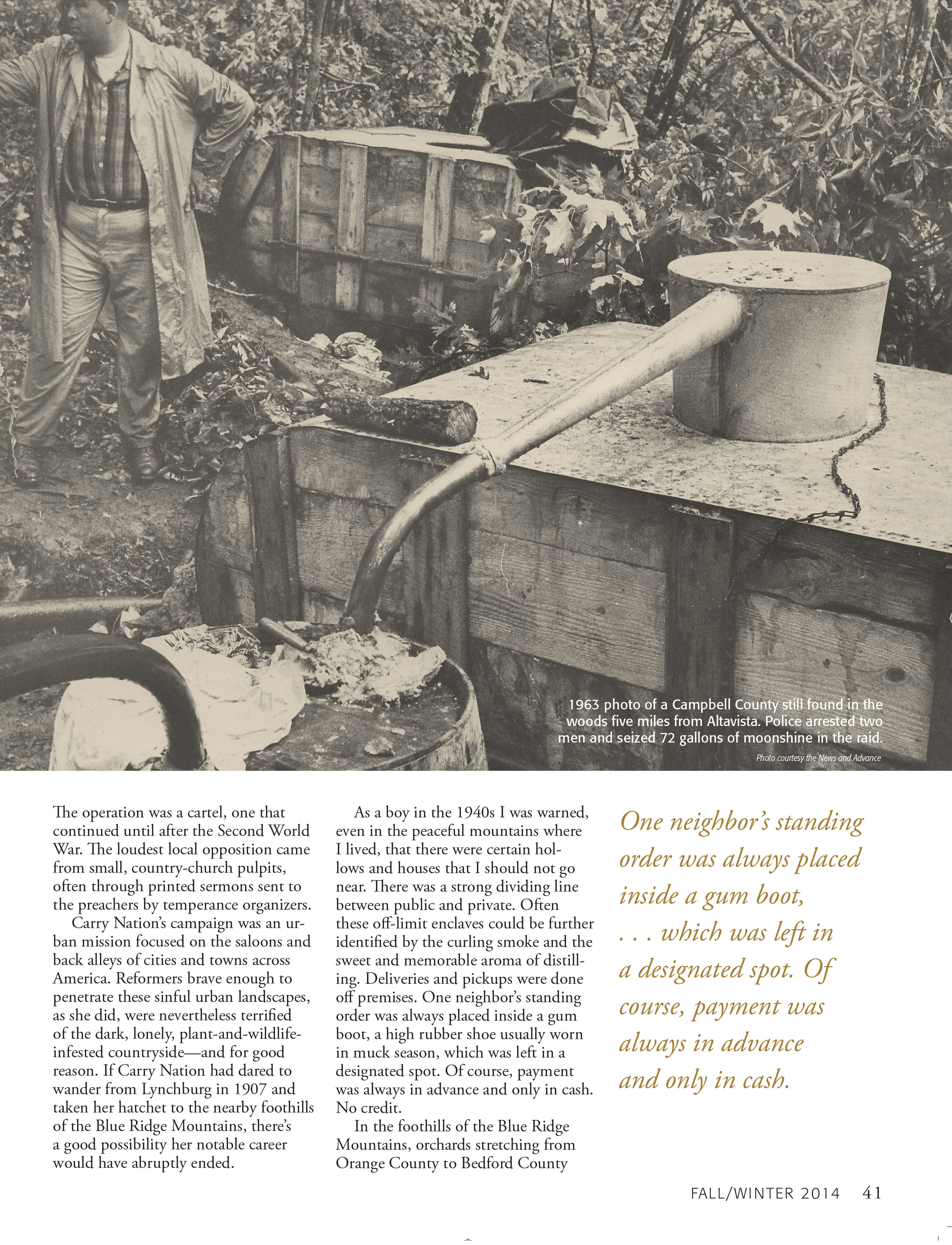Where Carry Nation Did Not Go: Prohibition in the Blue Ridge Mountains


The operation was a cartel, one that continued until after the Second World War. The loudest local opposition came from small, country-church pulpits, often through printed sermons sent to the preachers by temperance organizers. Carry Nation’s campaign was an urban mission focused on the saloons and back alleys of cities and towns across America. Reformers brave enough to penetrate these sinful urban landscapes, as she did, were nevertheless terrified of the dark, lonely, plant-and-wildlifeinfested
countryside—and for good reason. If Carry Nation had dared to wander from Lynchburg in 1907 and taken her hatchet to the nearby foothills of the Blue Ridge Mountains, there’s a good possibility her notable career would have abruptly ended. As a boy in the 1940s I was warned, even in the peaceful mountains where I lived, that there were certain hollows and houses that I should not go near. There was a strong dividing line between public and private. Often these off-limit enclaves could be further identified by the curling smoke and the sweet and memorable aroma of distilling. Deliveries and pickups were done off premises. One neighbor’s standing order was always placed inside a gum boot, a high rubber shoe usually worn in muck season, which was left in a designated spot. Of course, payment was always in advance and only in cash. No credit.
In the foothills of the Blue Ridge Mountains, orchards stretching from Orange County to Bedford County grew the remarkable Albemarle Pippin and another classic apple known as the Winesap. This variety and one called Parmar made exquisite apple brandy. During Prohibition brandy was in great demand in Tidewater Virginia and elsewhere. Expensive, long, heavy-duty touring cars, the type often associated with gangsters in Chicago, would head to Richmond on Route 60 East with the back end nearly dragging the road to make deliveries to Richmond’s elegant John Marshall Hotel, where many out-of -town legislators were housed. The busiest time was when the legislature was in session.
Entire article available only in printed version. Lynch's Ferry is on sale at the following Lynchburg locations: Bookshop on the Avenue, Givens Books, Lynchburg Visitors Center, Old City Cemetery, Point of Honor, Market at Main, and Lynch's Ferry office at The Design Group, 1318 Church Street, Lynchburg.
countryside—and for good reason. If Carry Nation had dared to wander from Lynchburg in 1907 and taken her hatchet to the nearby foothills of the Blue Ridge Mountains, there’s a good possibility her notable career would have abruptly ended. As a boy in the 1940s I was warned, even in the peaceful mountains where I lived, that there were certain hollows and houses that I should not go near. There was a strong dividing line between public and private. Often these off-limit enclaves could be further identified by the curling smoke and the sweet and memorable aroma of distilling. Deliveries and pickups were done off premises. One neighbor’s standing order was always placed inside a gum boot, a high rubber shoe usually worn in muck season, which was left in a designated spot. Of course, payment was always in advance and only in cash. No credit.
In the foothills of the Blue Ridge Mountains, orchards stretching from Orange County to Bedford County grew the remarkable Albemarle Pippin and another classic apple known as the Winesap. This variety and one called Parmar made exquisite apple brandy. During Prohibition brandy was in great demand in Tidewater Virginia and elsewhere. Expensive, long, heavy-duty touring cars, the type often associated with gangsters in Chicago, would head to Richmond on Route 60 East with the back end nearly dragging the road to make deliveries to Richmond’s elegant John Marshall Hotel, where many out-of -town legislators were housed. The busiest time was when the legislature was in session.
Entire article available only in printed version. Lynch's Ferry is on sale at the following Lynchburg locations: Bookshop on the Avenue, Givens Books, Lynchburg Visitors Center, Old City Cemetery, Point of Honor, Market at Main, and Lynch's Ferry office at The Design Group, 1318 Church Street, Lynchburg.
^ Top
Previous page: When Carry Nation, “The Bar Room Smasher,†Came to Lynchburg
Next page: From the Editor
Site Map




